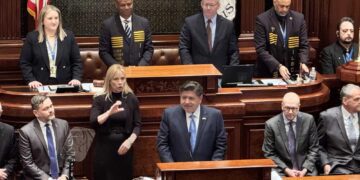CHICAGO – With four out of 10 in Illinois' working age population showing an arrest or conviction record, the background check process for job opportunities in the health care field needs to change, Illinois lawmakers decided.
The Illinois Senate passed the measure unanimously, while the House vote of 77 to 35 did not fall along party lines.
Governor Pritzker signed SB 1945 into law Wednesday.
“Over 4 million Illinoisans have an arrest or conviction record – that includes over 40 percent of our working age population,” said Governor JB Pritzker. “This vicious cycle of poverty, crime and injustice – which disproportionately impacts communities of color – does a disservice to everyone involved, from affected families to employers to taxpayers. I’m so proud that this legislation will dismantle another part of the wall that blocks people with records from living a dignified life. Today, with this action, we’re showing the world that we are building an Illinois that works for everyone.”
Senate Bill 1965 creates a timelier and efficient health care waiver application process, expands the list of eligible organizations that can initiate a fingerprint-based background check and those than can request waivers to include workforce intermediaries and pro bono legal service organization, and allows people with disqualifying conditions to obtain waivers before receiving a job offer, Pritzker's office said.
Prior to the passage of SB 1965, only health care employers who extended a conditional offer to an applicant could begin a fingerprint-based background check. The new law expedites that process to reduce the barriers to employment and occupational licensing within the state’s health care sector, which is projected to be the fastest growing industry in the next 10 years. SB 1965 takes effect immediately.
“Governor Pritzker has once again demonstrated his commitment to communities throughout the state of Illinois by signing SB 1965 into law. Securing employment is critical to decreasing the likelihood of recidivism,” said Lieutenant Governor Juliana Stratton. “SB 1965 is a critical piece of legislation that will expand opportunity, justice, and equity throughout Illinois while increasing the pool of qualified candidates to fill much-needed positions.”
“This new law will help many throughout the state get their lives back on track,” said Senator Elgie R. Sims, Jr. (D-Chicago). “It will put people back to work and help keep them out of our prison system. By getting these background checks done upfront, we provide a greater level of transparency between applicants and employers, avoid wait times and help Illinoisans with criminal records have a better shot at getting a job.”
“As Illinois pushes forward with criminal justice reform, it is extremely important that we enhance and create opportunities for returning citizens to be productive in society and in our economy,” said Rep. Justin Slaughter (D-Chicago). “SB 1965 represents a major step forward in reducing recidivism in Illinois, as it will facilitate employment in the healthcare industry for ex-offenders that have embraced rehabilitation and turned their lives around.”
“Today is a great day for thousands of Illinoisans who will now have access to careers in healthcare, earn a living and provide for their families, thereby creating stronger and safer communities,” said Sodiqa R. Williams, General Counsel and Vice President of External Affairs at Safer Foundation.
By 2026, the Safer Foundation estimates that more than 93,000 jobs will need to be filled in the industry, more than 18,000 healthcare technicians and more than 74,000 in health care support.
Ten House Democrats in what could be considered swing districts voted "No": Bristow, Costa Howard, Didech, Mason, Mussman, Pappas, Reitz, Stuart, Villa and Walker.
Sixteen House Republicans Bourne, Brady, Butler, Caulkins, Davidsmeyer, Demmer, Durkin, McAuliffe, Meier, Parkhurst, Reick, Sommer, Spain, Swanson, Ugaste, and Weber separated from their Republican colleagues to support SB 1965.







